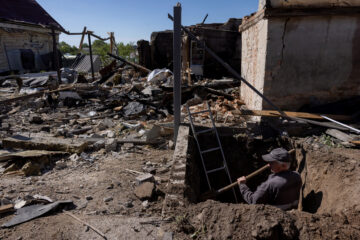Political earthquake in France as far right triumphs in EU vote
Marine Le Pen\’s far-right National Front stunned France\’s political elite on Sunday as exit polls put it on track to win European Parliament elections there, with Francois Hollande\’s Socialists well behind in third place.
The anti-immigration, anti-EU party would win 23 to 25 of France\’s 74 seats in the European Parliament, according to average results from five polling institutes published on Sunday. The party currently holds three seats.
The centre-right UMP was in second place with a projected 20-21 percent of the vote, and the ruling Socialist Party was in third place with just 14-15 percent.
France\’s preliminary results were reflected in other European countries, with strong showings for anti-immigrant and anti-EU parties in Greece, Denmark and the UK.
Marine Le Pen, the National Front\’s leader, said: "The people have spoken loud and clear. They no longer want to be led by those outside our borders, by EU commissioners and technocrats who are unelected."
She also called for the French national assembly to be dissolved on the basis of the results.
"What else can the president do after such a rejection? It is unacceptable that the assembly should be so unrepresentative of the French people."
If the polls are correct, the EU election will be the National Front\’s biggest success in a nationwide poll.
"It\’s an earthquake," said Manuel Valls, the Socialist prime minister brought in by President Francois Hollande barely two months ago after the party suffered a similar rout in local elections.
In Greece anti-EU parties are polling very well and in the UK, the anti-immigration party Ukip could provide a shock.
The AFP reported that anti-immigration Danish People\’s Party had won its country\’s EU elections.
Exit polls in Sweden showed the Feminist Initiative Party entering the European Parliament for the first time.
In Germany, Chancellor Angela Merkel\’s conservatives claimed victory despite strong gains for the centre-left Social Democrats. A new anti-euro party, the Alternative for Germany made its debut into the parliament.
Turnout averaged at 43.11 percent across the 28-nation European Union, observers said – fractionally higher than the 43 percent in 2009, which was the lowest rate ever.
In Belgium, voters are also choosing a new national government. The last election left the country which hosts the EU capital, Brussels, without a government for 18 months, until a three-party coalition could be put together.
The 751 seats are allocated in proportion to each country\’s population.
The vote will affect the lives of the EU\’s 500 million citizens, and the chamber has much more power than it used to.
It is a co-legislator, with government ministers from the EU\’s 28 member-states, in most policy areas.
One of the first tasks of the incoming parliament will be to elect a new president of the European Commission, the EU\’s executive body.
Source: Agencies
[do_widget_area inner_adsbar]











